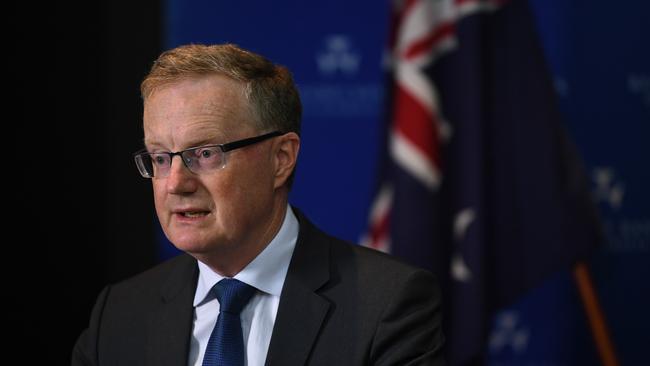QE could end in February: RBA
Governor Philip Lowe says if Australia has a good summer, the central bank’s $4bn-a-week bond buying program could end within two months.

Reserve Bank governor Philip Lowe says the central bank’s $4bn-a-week bond buying program could end as soon as February, should spending and jobs growth come in better than expected over the summer break.
Dr Lowe also said the best way to address the country’s housing affordability crisis was to build more homes, as he again played down fears that inflationary pressures could trigger rate hikes as early as next year.
The RBA governor has said for some time that the RBA would reconsider the pace of its quantitative easing, or QE, when it next meets in the New Year, but in a speech this morning in Wagga Wagga, NSW, he flagged the central bank may move more quickly to rein in an extraordinary monetary policy measure introduced to help the economy through the Covid-19 health crisis.
“We have made no decision yet,” Dr Lowe said, noting that “as 2021 draws to a close, the economy is in recovery mode”.
“Much will depend upon the news we receive between now and when we meet in February,” he said.
“Importantly, we will receive further readings on inflation and the strength of the labour market, and learn about the strength of spending in the economy over the summer. We will also learn more about the actions of other central banks and the effects of the Omicron variant.”
The Australian Bureau of Statistics will release unemployment figures for November at 11:30 this morning.
Dr Lowe’s speech comes mere hours after US Federal Reserve flagged the potential for three rate hikes in 2022 and halved its bond-buying program.
Fed chairman Jerome Powell has been forced to move more quickly than anticipated to quell runaway inflation which has hit multi-decade highs amid labour market shortages, global supply chain snarls and an overstimulated economy.
“The situation here in Australia is quite different,” Dr Lowe said, noting headline inflation has only reached 3 per cent – or half the American rate – “largely due to higher prices for petrol and constructing a new home”.
He noted that electricity and gas prices have not popped here as they have overseas.
The RBA governor again said Australian wages remained “relatively low” and were only expected to rise modestly and slowly over the coming two years, despite unemployment pushing toward 4 per cent by 2023.
“The Reserve Bank Board will not increase the cash rate until actual inflation is sustainably in the 2–3 per cent target range,” Dr Lowe said.
“We are still a fair way from that point. In our central scenario, the condition for an increase in the cash rate will not be met next year. It is likely to take time for that condition to be met and the board is prepared to be patient,” he said.
A premature end to QE would come after the RBA also before its last meeting discontinued its three-year yield target, but only after some wild swings in fixed interest markets in the week leading up to the formal announcement.
Dr Lowe’s forthright comments this morning suggest the RBA will be keen to avoid similar market dislocation leading up to the next meeting.
The RBA governor repeated that the board would make the decision around whether to taper QE and by how much based on three factors: the progress towards its full employment and inflation goals; the actions of other central banks; and the smooth functioning of the bond market.
Dr Lowe said at the last board meeting, three options around QE were discussed.
“The first option discussed was to further taper the bond purchases from the current rate of $4 billion a week, with an expectation that the purchases would come to an end in May. The second was to taper further and then review the situation again in May. The third option was to cease bond purchases altogether in February,” he said.
“If better-than-expected progress towards the Board’s goals was made, then the case to cease bond purchases in February would be stronger. Alternatively, if progress is slower than expected, or if the outlook becomes more uncertain, the case for retaining flexibility and reviewing again in May would be stronger,” he said.




To join the conversation, please log in. Don't have an account? Register
Join the conversation, you are commenting as Logout